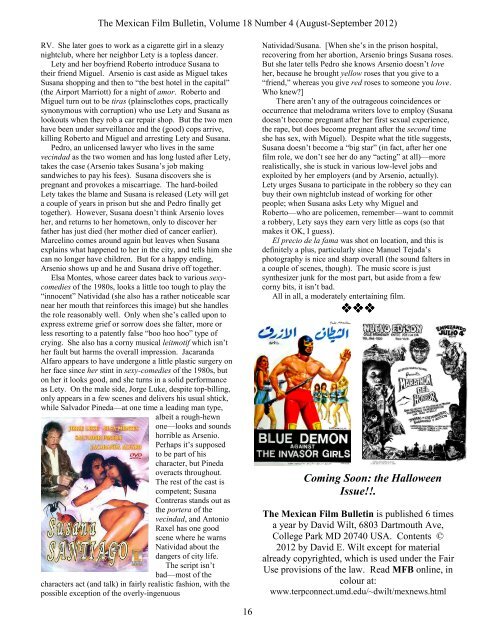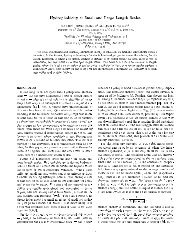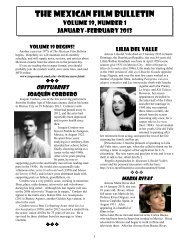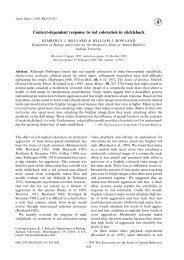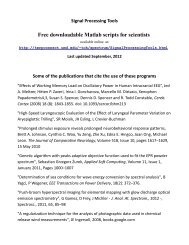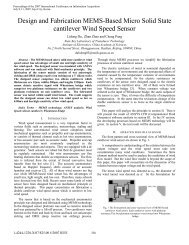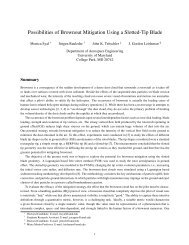Bonus Jorge Luke Film Review - TerpConnect
Bonus Jorge Luke Film Review - TerpConnect
Bonus Jorge Luke Film Review - TerpConnect
Create successful ePaper yourself
Turn your PDF publications into a flip-book with our unique Google optimized e-Paper software.
The Mexican <strong>Film</strong> Bulletin, Volume 18 Number 4 (August-September 2012)<br />
RV. She later goes to work as a cigarette girl in a sleazy<br />
nightclub, where her neighbor Lety is a topless dancer.<br />
Lety and her boyfriend Roberto introduce Susana to<br />
their friend Miguel. Arsenio is cast aside as Miguel takes<br />
Susana shopping and then to “the best hotel in the capital”<br />
(the Airport Marriott) for a night of amor. Roberto and<br />
Miguel turn out to be tiras (plainsclothes cops, practically<br />
synonymous with corruption) who use Lety and Susana as<br />
lookouts when they rob a car repair shop. But the two men<br />
have been under surveillance and the (good) cops arrive,<br />
killing Roberto and Miguel and arresting Lety and Susana.<br />
Pedro, an unlicensed lawyer who lives in the same<br />
vecindad as the two women and has long lusted after Lety,<br />
takes the case (Arsenio takes Susana’s job making<br />
sandwiches to pay his fees). Susana discovers she is<br />
pregnant and provokes a miscarriage. The hard-boiled<br />
Lety takes the blame and Susana is released (Lety will get<br />
a couple of years in prison but she and Pedro finally get<br />
together). However, Susana doesn’t think Arsenio loves<br />
her, and returns to her hometown, only to discover her<br />
father has just died (her mother died of cancer earlier).<br />
Marcelino comes around again but leaves when Susana<br />
explains what happened to her in the city, and tells him she<br />
can no longer have children. But for a happy ending,<br />
Arsenio shows up and he and Susana drive off together.<br />
Elsa Montes, whose career dates back to various sexycomedies<br />
of the 1980s, looks a little too tough to play the<br />
“innocent” Natividad (she also has a rather noticeable scar<br />
near her mouth that reinforces this image) but she handles<br />
the role reasonably well. Only when she’s called upon to<br />
express extreme grief or sorrow does she falter, more or<br />
less resorting to a patently false “boo hoo hoo” type of<br />
crying. She also has a corny musical leitmotif which isn’t<br />
her fault but harms the overall impression. Jacaranda<br />
Alfaro appears to have undergone a little plastic surgery on<br />
her face since her stint in sexy-comedies of the 1980s, but<br />
on her it looks good, and she turns in a solid performance<br />
as Lety. On the male side, <strong>Jorge</strong> <strong>Luke</strong>, despite top-billing,<br />
only appears in a few scenes and delivers his usual shtick,<br />
while Salvador Pineda—at one time a leading man type,<br />
albeit a rough-hewn<br />
one—looks and sounds<br />
horrible as Arsenio.<br />
Perhaps it’s supposed<br />
to be part of his<br />
character, but Pineda<br />
overacts throughout.<br />
The rest of the cast is<br />
competent; Susana<br />
Contreras stands out as<br />
the portera of the<br />
vecindad, and Antonio<br />
Raxel has one good<br />
scene where he warns<br />
Natividad about the<br />
dangers of city life.<br />
The script isn’t<br />
bad—most of the<br />
characters act (and talk) in fairly realistic fashion, with the<br />
possible exception of the overly-ingenuous<br />
16<br />
Natividad/Susana. [When she’s in the prison hospital,<br />
recovering from her abortion, Arsenio brings Susana roses.<br />
But she later tells Pedro she knows Arsenio doesn’t love<br />
her, because he brought yellow roses that you give to a<br />
“friend,” whereas you give red roses to someone you love.<br />
Who knew?]<br />
There aren’t any of the outrageous coincidences or<br />
occurrence that melodrama writers love to employ (Susana<br />
doesn’t become pregnant after her first sexual experience,<br />
the rape, but does become pregnant after the second time<br />
she has sex, with Miguel). Despite what the title suggests,<br />
Susana doesn’t become a “big star” (in fact, after her one<br />
film role, we don’t see her do any “acting” at all)—more<br />
realistically, she is stuck in various low-level jobs and<br />
exploited by her employers (and by Arsenio, actually).<br />
Lety urges Susana to participate in the robbery so they can<br />
buy their own nightclub instead of working for other<br />
people; when Susana asks Lety why Miguel and<br />
Roberto—who are policemen, remember—want to commit<br />
a robbery, Lety says they earn very little as cops (so that<br />
makes it OK, I guess).<br />
El precio de la fama was shot on location, and this is<br />
definitely a plus, particularly since Manuel Tejada’s<br />
photography is nice and sharp overall (the sound falters in<br />
a couple of scenes, though). The music score is just<br />
synthesizer junk for the most part, but aside from a few<br />
corny bits, it isn’t bad.<br />
All in all, a moderately entertaining film.<br />
��� ��� ��� ���<br />
Coming Soon: the Halloween<br />
Issue!!.<br />
The Mexican <strong>Film</strong> Bulletin is published 6 times<br />
a year by David Wilt, 6803 Dartmouth Ave,<br />
College Park MD 20740 USA. Contents ©<br />
2012 by David E. Wilt except for material<br />
already copyrighted, which is used under the Fair<br />
Use provisions of the law. Read MFB online, in<br />
colour at:<br />
www.terpconnect.umd.edu/~dwilt/mexnews.html


